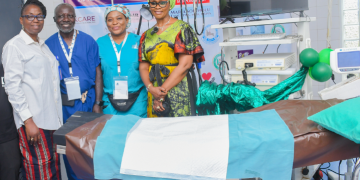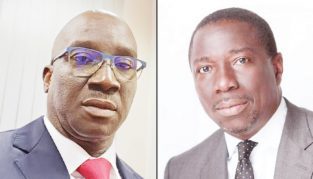Embattled Nigerian Senator, Ike Ekweremadu, his wife, his daughter, and a doctor will know their separate and collective fates today regarding court sentencing after they had been convicted of organ trafficking in the United Kingdom weeks earlier.
This is going to be the first sentencing of its kind under the Modern Slavery Act in the UK.
Ahead of such sentencing, former president Olusegun Obasanjo had written the UK Court official asking for clemency on behalf of the Ekweremadus.
A member of House of Representatives from Enugu, home state of Ike Ekweremadu also sought the lswmakers’ intervention to lessen the punishment for former Deputy Senate President.
The Senator risks life imprisonment in the extreme or a jail term of between 5 and 10 years depending on whichever one the court elects to slam on him.
The Daily Crucible reports that Ike Ekweremadu, 60, his wife, Beatrice, 56, and Dr Obinna Obeta, 51, were found in March this year, guilty of facilitating the travel of a young man to Britain with a view to his exploitation after a six-week trial at the Old Bailey.
However, the Ekweremadus’ daughter Sonia, 25, shed tears as she was cleared of the same charge after jurors deliberated for nearly 14 hours.
The former Deputy President of Nigerian Senate and others criminally conspired to bring a 21-year-old Lagos street trader to London to exploit him and harvest his kidney, the jury found.
The man, who cannot be named for legal reasons, had been offered an illegal reward to become a donor for the senator’s daughter after kidney disease forced her to drop out of a master’s degree in film at Newcastle University, the court heard.
Back in February 2022, the young man was falsely presented to a private renal unit at Royal Free hospital in London as Sonia’s cousin in a failed attempt to persuade medics to carry out an £80,000 transplant. For a fee, a medical secretary at the hospital acted as an Igbo translator between the man and the doctors to help try to convince them he was an altruistic donor, the court heard.
The prosecutor Hugh Davies KC told the court the Ekweremadus and Obeta had treated the man and other potential donors as “disposable assets – spare parts for reward”. He said they entered an “emotionally cold commercial transaction” with the man.
The behaviour of Ekweremadu, a successful lawyer and founder of an anti-poverty charity who helped draw up Nigeria’s laws against organ trafficking, showed “entitlement, dishonesty and hypocrisy,” Davies told the jury.
He said Ekweremadu, who owns several properties and had a staff of 80, “agreed to reward someone for a kidney for his daughter – somebody in circumstances of poverty and from whom he distanced himself and made no inquiries, and with whom, for his own political protection, he wanted no direct contact.”









































